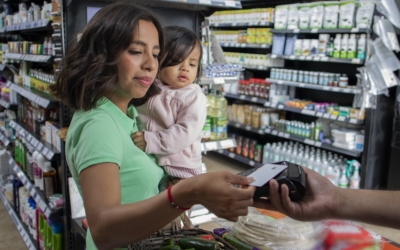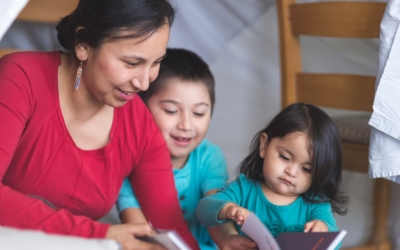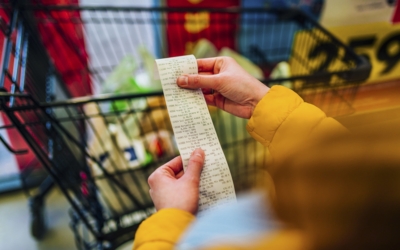I Can for Kids (iCAN) focuses on designing new solutions rather than dwelling on old problems. We collaborate with likeminded partners to strengthen our city’s collective potential to create meaningful change. We’ve already shared how our grocery gift card model offers many psychological benefits to food-insecure families. Our income-based response also strengthens evidence to advocate for better policy responses that could drastically reduce the rate of food insecurity in Calgary and beyond.
Now we’d like to share how our collaborative model helps boost the resilience of food-insecure kids who are more vulnerable to the long-term effects of childhood trauma.
Understanding adverse childhood experiences
Adverse childhood experiences (ACEs) are defined as traumatic life experiences that occur during a child’s formative years before age 18. A large body of research shows that early life adversity is linked to a wide range of complex social, health, and economic struggles during adulthood, such as mental illness, chronic health conditions, and poverty. Experts identify a range of adverse experiences that includes, but is not limited to:
- physical or emotional abuse
- neglect or inability to meet all basic needs
- divorce or breakdown of parental relationships
- death of a primary parent or caregiver
- exposure to domestic violence in the home
- living with adults who commit crime or go to jail
- living with adults who grapple with addictions or mental health issues
Linking childhood adversity, poverty, and food insecurity
Many studies demonstrate a significant link between childhood adversity and poverty. We also know that a family’s inability to buy enough healthy food is caused by inadequate income. Thus, it’s no surprise that emerging research reveals a strong relationship between trauma and food insecurity.
Researchers note that children exposed to any ACE are more likely to experience food insecurity, and their risk increases with each additional trauma they encounter. A series of recent studies reveals how:
- children exposed to one ACE are twice as likely to report the experience of severe food insecurity, whereas kids exposed to three or more ACEs are eight times as likely to live in a severely food-insecure household
- adolescents who endure four or more ACEs are five-and-a-half times more likely to experience food insecurity compared to teens who experience no adversity
- food-insecure households are less likely to report protective life experiences for their children (such as solid family resilience or regular participation in after-school activities) due to poor access to supportive social and economic resources
Collaborating to minimize childhood trauma
iCAN designed a service model that empowers food-insecure recipients to tackle multiple socioeconomic barriers through improved access to a broad range of supports. We target our grocery gift card program through a robust network of frontline agencies who also have the expertise to help families prevent or address the harmful impacts of other life stressors. Notably, our research shows how our program offers agencies an opportunity to create more trust and stronger relationships with vulnerable households.
While iCAN helps alleviate the specific trauma of food insecurity, our agency partners help recipients minimize the damage caused by other adverse childhood experiences, such as lack of family bonding, domestic violence, homelessness, mental health concerns, and exposure to criminal activity.
We receive many testimonials from recipients who value the way our program creates a safe space to tackle many of their life challenges in a holistic manner. We’d like to share a message from a new immigrant family with three children who needed to access a variety of community support services until one of the parents could secure full-time employment:
“The agency always just seems to know when I need the gift cards. It’s so hard to ask for help, but the grocery gift card program never makes you feel bad or ashamed. I’ve never felt any judgment from anyone when I get or use cards. I also feel very comfortable talking with the staff and that makes it easier to get all kinds of support. They really know my situation and they know about my kids. Most of all, the grocery gift cards make me feel like my family isn’t at as much risk for all sorts of problems.”
Inspiring resilient futures
Your support for our grocery gift card program also creates new opportunities to prevent, reduce, or transform the far-reaching effects of trauma on vulnerable children across Calgary. When you donate to our program, you contribute to a powerful force for positive change that empowers food-insecure kids and families to lead healthier, happier, and more peaceful lives.
To join iCAN’s expanding list of donors, sponsors, and champions, check out the different ways you can get involved or donate.
To learn more about I Can for Kids and their unique approach to childhood food insecurity, visit www.icanforkids.ca
About Donald Barker
Donald Barker has worked as a registered dietitian for more than 25 years. He also has a professional background in communications and has long advocated for populations who face adverse, unjust, or systemic barriers that lead to higher rates of poor social, mental, emotional, and physical health outcomes. Donald currently volunteers as an Advisor with iCAN to support our transition towards evidence-based approaches that help improve the well-being of children in Calgary who live in low-income and food-insecure households.
About I Can for Kids Foundation
I Can for Kids works closely with multiple agency partners to target and distribute grocery gift cards to food-insecure families who are most in need. The iCAN grocery gift card program is a more dignified and inclusive approach to dealing with food insecurity, allowing families to shop where everyone else shops and to choose foods that are appropriate for their health and cultural needs. Explore their website to discover more about iCAN’s impact over the years.
For more information and media inquiries, please contact iCAN Executive Director, Bobbi Turko at bobbi@icanforkids.ca.




